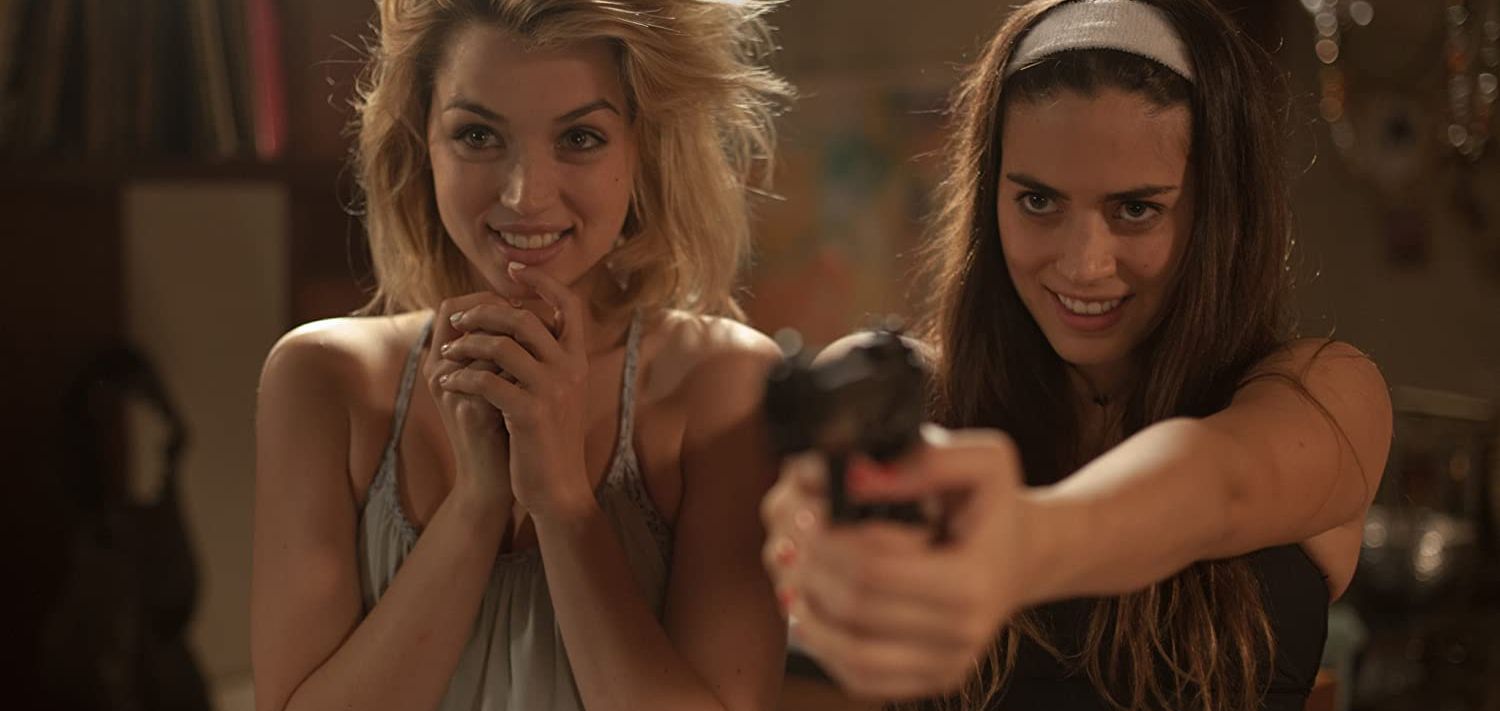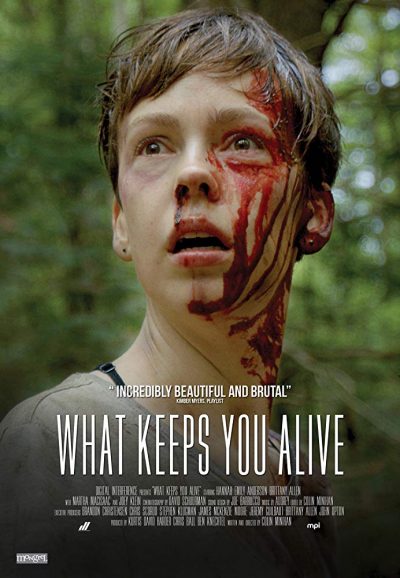★★★½
“Patience is a virtue.”
 If you came into this with absolutely no previous knowledge (including the poster on the right!), you’d be forgiven if you spent the first forty minutes thinking this was an independent drama about the perils of professional dating life in the big city. Then, suddenly, it’s very not. But initially, it’s about Nicole (Shannon), who while she may be a little strange and anti-social, doesn’t seem all that far outside the bounds of normal behaviour. Well, I guess her carting a bottle of hard liquor to work, for drinking sessions in the bathroom, is somewhat problematic. Maybe her imagining dinner with her parents could be a bit of a red flag. [The film makes nice use of switching between b&w and colour, to separate reality from flashbacks and fantasy] But, all told, she’s fairly high-functioning.
If you came into this with absolutely no previous knowledge (including the poster on the right!), you’d be forgiven if you spent the first forty minutes thinking this was an independent drama about the perils of professional dating life in the big city. Then, suddenly, it’s very not. But initially, it’s about Nicole (Shannon), who while she may be a little strange and anti-social, doesn’t seem all that far outside the bounds of normal behaviour. Well, I guess her carting a bottle of hard liquor to work, for drinking sessions in the bathroom, is somewhat problematic. Maybe her imagining dinner with her parents could be a bit of a red flag. [The film makes nice use of switching between b&w and colour, to separate reality from flashbacks and fantasy] But, all told, she’s fairly high-functioning.
That all changes when she goes out on a rare date with John (Green), whom she met through an online app. She’s simultaneously fending off advances from a co-worker (Busey) and neighbour (Lockhart) – it must be said, all the men here fall somewhere on the creepy/predatory spectrum. What we know, but Nicole initially does not, is that John is well toward the latter, with a fondness for date rape and every intention of adding Nicole to his list of dubious conquests. However, her day drinking has given her a remarkable tolerance for alcohol, so when he makes his move, she’s not as drunk as she should be, and fights back, with no shortage of vigour. As well as a knife. That’s where the tone of the film changes drastically. We’re not in Sex and the City any more, Toto.
The rest is considerably closer to pitch-black humour, as Nicole has to come to terms with the consequences of her actions. Realizing what John was intending, she decides simply to dispose of his body. This requires a late-night trip to the hardware store, where the Goth assistant nods approvingly at her selection of tools. Then there’s the actual dismemberment, not helped by John’s corpse continuing to talk to her throughout the process. For example, he requests a refill on his wine, only to realize it’s hard to drink since she’s removed his hands.
This disposal reminded me a little of A Good Woman is Hard to Find, though that was thoroughly serious. There are also elements of Ms. 45. in a blurring of the lines between reality and delusion, which are deftly handled. Regular readers won’t be surprised to learn I preferred this second half of the film. I was actually a bit disappointed things ended when they did, more or less with Nicole’s return to work, and in a maybe or maybe not more well-adjusted state. It felt there was mileage left on the table, with her further adventures as an IT worker, moonlighting as a killer of sexual predators. We can only hope for Nicole 2: Ax Me Anything at some point down the road.
Dir: James Schroeder
Star: Tamika Shannon, Stephen Green, Ke’Shawn Bussey, Tre Lockhart





 While ultimately hamstrung, not least by its limited resources – this cost a mere five thousand dollars – it does what low-budget films should generally tend to do. That is, go where their better-off siblings dare not tread. In this case, that’s the forbidden territory of religion. Two young, female missionaries, Amber (Durand) and Martha (Crosland) are going door-to-door, seeking souls they can save and bring into the body of their church – clearly Mormon, going by the reference to Salt Lake City among other things, though operating under a pseudonym here! While their attractive shape proves successful at getting them in the door, the residents who don’t live up to the ladies’ high moral standards are in for a shock. For the two kill non-believers, with Amber in particular, having a zero tolerance policy. And she considers herself “saved”, basically giving her a free pass to do anything necessary in the name of the Lord.
While ultimately hamstrung, not least by its limited resources – this cost a mere five thousand dollars – it does what low-budget films should generally tend to do. That is, go where their better-off siblings dare not tread. In this case, that’s the forbidden territory of religion. Two young, female missionaries, Amber (Durand) and Martha (Crosland) are going door-to-door, seeking souls they can save and bring into the body of their church – clearly Mormon, going by the reference to Salt Lake City among other things, though operating under a pseudonym here! While their attractive shape proves successful at getting them in the door, the residents who don’t live up to the ladies’ high moral standards are in for a shock. For the two kill non-believers, with Amber in particular, having a zero tolerance policy. And she considers herself “saved”, basically giving her a free pass to do anything necessary in the name of the Lord. This is the kind of film which makes for very uncomfortable date night viewing, simply because the situation presented is likely to lead to awkward conversations. Happily married architect Evan Webber (Reeves) has the house to himself for the weekend, his wife having gone with their two kids to the seaside, leaving him free to work on a project. A stormy night ensues, until a knock at the door, and he finds two lost young women, Genesis (Izzo) and Bel (de Armas), shivering on the doorstep. He can hardly make them stay there, so lets them in. Almost immediately, something is wrong, though initially this falls into the “Too good to be true” category. For they are nymphomaniac flight attendants, and inevitably – though after a credible struggle – Evan succumbs to their relentless charms.
This is the kind of film which makes for very uncomfortable date night viewing, simply because the situation presented is likely to lead to awkward conversations. Happily married architect Evan Webber (Reeves) has the house to himself for the weekend, his wife having gone with their two kids to the seaside, leaving him free to work on a project. A stormy night ensues, until a knock at the door, and he finds two lost young women, Genesis (Izzo) and Bel (de Armas), shivering on the doorstep. He can hardly make them stay there, so lets them in. Almost immediately, something is wrong, though initially this falls into the “Too good to be true” category. For they are nymphomaniac flight attendants, and inevitably – though after a credible struggle – Evan succumbs to their relentless charms.
 For most films. I’ve usually got a fairly good idea of what is likely to be the final review grade, inside about 30 minutes. It may drift half a star up or down, but it’s relatively rare for there to be more variation than that. This would be one such case, which started off as underwhelming, went through a brief surge of “Oh, yeah – I get it!” in the middle, before returning to the mediocrity from whence it came. At various points, this could have been anywhere between ★½ and (although briefly) ★★★★. Well done, I guess?
For most films. I’ve usually got a fairly good idea of what is likely to be the final review grade, inside about 30 minutes. It may drift half a star up or down, but it’s relatively rare for there to be more variation than that. This would be one such case, which started off as underwhelming, went through a brief surge of “Oh, yeah – I get it!” in the middle, before returning to the mediocrity from whence it came. At various points, this could have been anywhere between ★½ and (although briefly) ★★★★. Well done, I guess? Turns out, interesting is not the same as good or entertaining. Who knew? If you watch this unaware, as I did, you are certainly going to be very,
Turns out, interesting is not the same as good or entertaining. Who knew? If you watch this unaware, as I did, you are certainly going to be very, 
 The above is the Polish for “seven”, and in the first half-hour, you’ll be forgiven for thinking that’s what you’re watching: a Polish knock-off of David Fincher’s Se7en. Homicide cop Helena Rus (Kożuchowska) is struggling to come to terms with life, after her boyfriend is killed by a drunk-driver and, for political reasons, the criminal is allowed to go free. A welcome distraction comes in the shape of a series of ritualistic murders: every day at 6 pm, a body turns up on the streets of Wroclaw. The victims have been killed in strange and unusual ways – the first, for example, is sewn inside a cow-hide, which shrinks as it dries, crushing the victim to death. Each has a word branded into their flesh, such as “Degenerate”.
The above is the Polish for “seven”, and in the first half-hour, you’ll be forgiven for thinking that’s what you’re watching: a Polish knock-off of David Fincher’s Se7en. Homicide cop Helena Rus (Kożuchowska) is struggling to come to terms with life, after her boyfriend is killed by a drunk-driver and, for political reasons, the criminal is allowed to go free. A welcome distraction comes in the shape of a series of ritualistic murders: every day at 6 pm, a body turns up on the streets of Wroclaw. The victims have been killed in strange and unusual ways – the first, for example, is sewn inside a cow-hide, which shrinks as it dries, crushing the victim to death. Each has a word branded into their flesh, such as “Degenerate”. Within about two minutes of starting this, I realized I had made a terrible mistake, and was watching something barely reaching the amateur level of film production. Still, I soldiered on – albeit for some loose definition of “soldiered” – until the bitter end, mostly so I could issue an informed warning about this to any prospective viewers. Maxine (Mitchell) is rather upset when she discovers her boyfriend, music video producer Lance (Watts) has been cheating on her with Lana (Bryant). Mind you, she’s clearly a bit unhinged already: for example, telling him she’s pregnant when she isn’t. So it’s not much of a surprise when her reaction to his two-timing is to kidnap Lance, tie him up in her basement and submit him to various indignities, along with seeking revenge on Lana. Which, apparently, includes sleeping with her father (Walker).
Within about two minutes of starting this, I realized I had made a terrible mistake, and was watching something barely reaching the amateur level of film production. Still, I soldiered on – albeit for some loose definition of “soldiered” – until the bitter end, mostly so I could issue an informed warning about this to any prospective viewers. Maxine (Mitchell) is rather upset when she discovers her boyfriend, music video producer Lance (Watts) has been cheating on her with Lana (Bryant). Mind you, she’s clearly a bit unhinged already: for example, telling him she’s pregnant when she isn’t. So it’s not much of a surprise when her reaction to his two-timing is to kidnap Lance, tie him up in her basement and submit him to various indignities, along with seeking revenge on Lana. Which, apparently, includes sleeping with her father (Walker). It’s quite a feat for a film which runs a crisp 67 ½ minutes to outstay its welcome, so… Well done? The problem is mostly that far too much time is wasted on the set-up, introducing us – in quite excruciating detail – to characters in whom we have little or no interest. These would be the friends who decide to spend a weekend in upstate New York, unaware they are about to cross paths with a pair of bored locals who have decided to alleviate the tedium by going on a killing spree. When one of them gets cold feet, however, it’s left up to Cat (Rafferty) to follow through on the original plan, which she does with some enthusiasm. Just a pity this doesn’t happen until roughly the final twenty minutes.
It’s quite a feat for a film which runs a crisp 67 ½ minutes to outstay its welcome, so… Well done? The problem is mostly that far too much time is wasted on the set-up, introducing us – in quite excruciating detail – to characters in whom we have little or no interest. These would be the friends who decide to spend a weekend in upstate New York, unaware they are about to cross paths with a pair of bored locals who have decided to alleviate the tedium by going on a killing spree. When one of them gets cold feet, however, it’s left up to Cat (Rafferty) to follow through on the original plan, which she does with some enthusiasm. Just a pity this doesn’t happen until roughly the final twenty minutes.